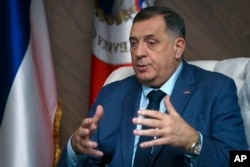When Russia launched its full invasion of Ukraine in February 2022, the European Union moved to suspend broadcasts by the Kremlin-backed outlets Sputnik and Russia Today, or RT, citing “systematic information manipulation and disinformation.”
But two years later, RT is developing a presence in Bosnia and Herzegovina in a move that analysts say could undermine the country’s Euro-Atlantic path and help spread disinformation.
RT chief editor Margarita Simonyan announced in December that the Serbian wing of the state-run outlet will enter the Bosnian market in 2024.
The RT network already has a website in the Serbian language in the West Balkans, but this will be its first TV presence inside Bosnia.
Borka Rudic, general secretary of the BH Journalists Association, said the potential arrival of Russian-backed media in the country is a journalistic and a political issue.
"It is not desirable to ban and challenge the activity of a certain media on the territory of Bosnia and Herzegovina in advance," said Rudic. "But in the context of political events in Bosnia and Herzegovina, this is a really controversial issue, given that Bosnia and Herzegovina as a country has taken on obligations from the process of joining the European Union."
Russia Today pushes back
When VOA Bosnian Service first reported on RT's announcement, the Russian broadcaster published an article on its website in Serbian saying that VOA “accuses RT of spreading Russian propaganda and Kremlin influence … and places fake news that RT’s arrival in Bosnia will further complicate [the] situation in Bosnia.”
Referring to a statement by a former Bosnian ambassador, the RT article added, "They [the U.S.] only cares about the expansion of NATO and the interests of the international community."
The Bosnian communications regulator said no legal obstacles exist to granting a license to RT. But the regulator’s director, Drasko Milinovic, added they have not yet received an application.
Cable operators working under the Mtel telecommunications company already offer RT English and Russia 24.
Mtel is in Banja Luka, the regional capital of the Republic of Srpska, which is one of two entities in Bosnia and Herzegovina.
Srpska authorities advocate for secession and are resistant to a NATO membership, while the other entity, the Bosnian Federation, is pushing for EU membership and to be part of NATO.
The availability of Kremlin-backed media in the region was raised at Russian President Vladimir Putin’s annual press conference in late 2023.
A journalist from Alternative Television asked the Russian leader about the political situation in Bosnia and Herzegovina and noted no Russian media operated inside the country.
Alternative is a privately run station based in Srpska. In 2022, the U.S. Treasury imposed sanctions on it, saying the station had direct connections, including financial ties, to regional President Milorad Dodik, who is also under U.S. sanctions.
"We are aware of the situation in the Republic of Srpska and Bosnia and Herzegovina. The assessments of that situation by our and your political leadership completely coincide,” Putin said.
He added that he would take up the matter with Oleg Borisovich Dobrodeev, director of the All-Russia State Television and Broadcasting Company.
Not long after that, RT editor-in-chief Simonyan said that broadcasting will begin in 2024.
Friendly relations
Srpska and neighboring Serbia have friendly relations with the Kremlin and Putin.
Last year, Dodik honored Putin with an award for his "patriotic concern and love for [Republicka Srpska]." He has also made regular comments that he would like the secession of the republic.
Dodik has also traveled to Russia and met with Putin since the war in Ukraine. He is currently under U.S. sanctions for corruption and undermining the Dayton Peace Agreement, which helped end the 1992-95 war.
Political analyst Adnan Huskic says Russia has an interest in Bosnia and Herzegovina and seeks to dismantle everything Western, undermining its path to full NATO membership.
Other analysts, including Elmir Sadikovic, say the arrival of Kremlin-backed media could hinder Bosnia’s European path.
“That will be a big step backwards for this relationship,” said Sadikovic, a professor of European integration at the Faculty of Political Science in Sarajevo.
Enver Halilovic, former ambassador of Bosnia and Herzegovina to Russia, agreed.
"The arrival of media financed by the Russian government to the territory of a country toward which it has a negative attitude and is against the NATO alliance, can set back the relations of Bosnia and Herzegovina with its international partners," Halilovic said.
Journalists have also raised concerns. Rubina Cengic, who works for the news website Interview.ba, said of RT’s content, "It will be propaganda reporting. They do not hide at all that they are a government media outlet.”
RT has already produced content that makes false claims about the region. A video released in April 2023 titled "Bosnia and Herzegovina: Rise of the Caliphate,” made a series of claims that are contrary to facts established by the Hague Tribunal and denies Serbian forces committed any war crimes in Srebrenica.
The Hague and courts in Bosnia and Herzegovina have concluded that Serbian forces executed between 7,000 and 8,000 Bosniaks, or Bosnian Muslims, from Srebrenica, according to the Balkan Research Network, which reports on war crimes in the region.
RT’s head, Simonyan, is sanctioned by Canada, the United Kingdom and the EU for her role in spreading Kremlin disinformation on the war in Ukraine.
Propaganda should not be ignored, said Ivana Stradner from the Washington-based Foundation for Defense of Democracy.
"Given that the situation in the region is really getting worse and worse, Russia is doing everything possible to deepen the even greater differences in Bosnia and Herzegovina," said Stradner. "So, in this way, he wants to send a signal to the West that Russia still has great influence in Bosnia and Herzegovina."
Stradner believes the Kremlin's goal is not to gain favor of a wider audience in Bosnia and Herzegovina, but it is enough to cause aversion toward the West.
Cengic sees one solution in media literacy, which could help people recognize propaganda and politically controlled reporting.
This story originated in VOA’s Bosnian Service.














